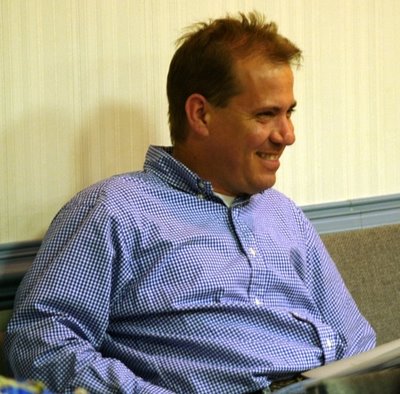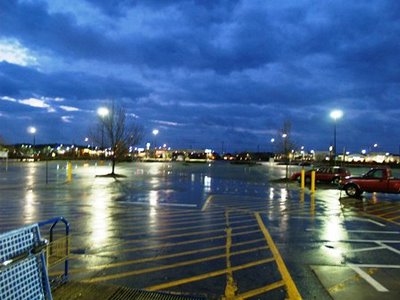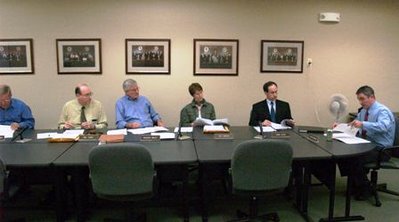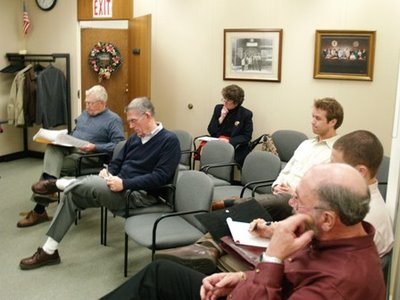I thought I had been keeping tabs on just how many stories have been written here so far but it looks like it got away from me and I went over the 1,000 mark.
This Blog originated on July 25, 2006, (5 months ago). The stories have averaged out to almost 7 stories a day, 7 days a week. Not too shabby for a local Blog.
2007 will be even better. We'll have a new location and a far better format to bring you the news. Newer technology and beter information to come. Thanks for being here and we'll see you tomorrow!

DelMarVa's Premier Source for News, Opinion, Analysis, and Human Interest Contact Publisher Joe Albero at alberobutzo@wmconnect.com or 410-430-5349
Attention
Tuesday, December 26, 2006
Wind Turbine Troubles By Dr. Jimmy Tragle, Part IIIA
Part III A
Operational events pose some points of concern. These are down to siting turbines on improper locations when it comes to affecting various populations.
Blade strikes are a big issue in at least three locations in the US where turbines are already sited. Perhaps the most famous one is Altamont in California. This is a site placed in an area that has a lot of raptor activity. The bird counts are tremendously high in this region.
Backbone Mountain in West Virginia and Buffalo Mountain in Tennessee have high numbers of bat kills. Buffalo Ridge MN has a high number but also has a high number of turbines compared to the other two. Backbone Mountain boasts the highest bat kill rates per turbine on the planet. Not a good record to have in my humble opinion. You may not think much of bats, but they're an important part of the local ecosystem and play an important factor in insect population control.
Industry stance on bat and bird kills are for me an indication of the absence of real concern for the environment. The bird kills are fobbed off by pointing out that cats, cars, power lines, towers, and high buildings kill a larger number of birds. They don't mention that the birds killed by most of these "problems" aren't the same type dying at Altamont. Not too many cats I know of that can bring down an eagle. And is it really sound to defend your destruction by pointing out the destruction of another source?
I personally witnessed a proponent for wind industry citing from findings of an expert witness that bats wouldn't be an issue on the Jack Mountain site. The claim was based upon the fact that bat feeding range doesn't typically go above tree canopy height. The turbine blades are much higher. Indications are that bat mortalities occur in migration, not feeding. Migration occurs at much greater heights above treetops. Bats also don't use their sonar capabilities when migrating. That may help in part to explain why they cannot miss the blades. In general though I'd think any flighted animal would have a difficult time dodging something that is going 180 MPH and has a pair of twins chasing it (each turbine has three blades).
Jack Mountain hosts a larger population of bats than Backbone Mountain. Logic would imply a potential for higher kill rates I would think. One of the latest maneuvers by the company that wishes to develop Jack Mountain is to ask to be excused from considering potential impacts to wildlife. Hardly the voice of an environmentally responsible organization, again, in my opinion. I do believe this covers the disregard for the cave systems mentioned in Part II. That also should wipe out concerns for the damage to waterways that drain the area many many miles away from the site.
Blade throw and ice throw are possible sources for animal and human injuries and property damage. Blade throw is where pieces of blade break off for a variety of reasons and get tossed by the spinning blade. Ice throw is where ice forms on blades and gets thrown in the same fashion. Siting set backs can serve to mitigate human injury (apart from facility employees and people that don't respect fence lines) as well as property damage. On the other hand I've been to a wind plant and I must say one of the turbines seemed dangerously close to a public road. There are equations that can be used to calculate blade and ice throw. One must also be aware that potential distances can go up for turbines sited on ridge tops. Think about how far you can throw an object up a steep hill vs how far you can throw it down a steep hill. There will be obvious limits on just how far the distance will increase as an object will eventually assume near vertical free fall, but one can expect greater blade throw distances on a steep mountain than on flat land. Then there is the question about what happens once a piece of airfoil strikes the ground on a steep mountain. It stands a good chance of carrying on down hill. Impact speeds can reach 200 mph. Imagine stopping several tons going that fast with your house. I personally find it to be a valid concern in the hills of West Virginia. It is not an issue in the ocean I suppose.
I've seen arguments from proponents that neither is of concern. There is one report of a German wind plant having a failure in a windstorm. The blades on a turbine failed and it spun up too fast for its own good. One of the blades flexed and hit the tower. This ripped off the entire blade and nacelle assembly sending 50+ tons of debris flying. One piece was reported to have gone over 1500 feet.
The argument has been put forward that ice throw isn't an issue as ice only forms on stationary blades. This is not quite the case. At elevations above 3500 feet (don't quote me, I may be wrong on the exact height) there is the increased probability that ice will form on moving blades just as it does on aircraft wings. It has also been suggested that the blades lose their aerodynamics and are therefore not apt to spin fast with ice on them. Somehow planes manage to fly with ice on the wings. Chunks of ice weighing several hundred pounds have been lobbed off blades.
In all honesty the modern blades are heated to help mitigate the ice issue. I have to admit that I don't know if this is done full time during appropriate conditions or if it is only done intermittently. I've seen no detailed commentary. The process does require electricity and is also an area of potential breakdown for the turbine. The heated blades come in as a potential drain to the electricity produced by turbines. That is an issue to be touched upon later.
As mentioned, appropriate siting can minimize these issues. And offshore they may not be a big deal provided curious boaters cannot get too close.
Noise pollution is a big issue and deserves a lot more attention than industry proponents wish to give it. This single topic deserves a lot of attention so I'm going to skip over it for this segment and bring it up in the next part.
Strobe effect describes the flashing that occurs when the sun reflects off the blades as they spin during sunset and sunrise. This is a rather disturbing occurrence for people living near turbines as it happens for a period each day the sun is out and shining. It will happen either at sunset or sunrise for a given household depending upon where the house is in relation to the turbines.
Shadow flicker is the same but opposite so to speak. The blades cast shadows that are particularly long near sunset and sunrise. For a given location this will occur at sunset if strobe occurs at sunrise and so on. Evidently pulling the blinds doesn't abate the problem as the shadows or flashes are still evident through all but the most opaque draperies.
One can surmise that during the winter months when the sun stays fairly low in the sky both of these events could be quite prolonged if the turbines are situated upon a ridge in a line and a house is positioned so the effect is brought upon the house by different turbines as the day rolls on.
Shadow flicker and strobe effect are reported to cause some issues with dizziness, nausea, and seizures in individuals so disposed.
Stray voltage has been reported on one dairy farm. Stray voltage occurs when there are improper grounding done, most often in barns with concrete floors and metal railings. A cow moves against a railing and gets electrocuted. In this particular case the dairy owner spent something akin to $100,000 on upgrades in an attempt to mitigate the problem. In frustration he disconnected some ground cables on the turbines and the problem went away. This was done illegally and to avoid prosecution the man didn't file suit against the power company. The cables were connected again and the problem returned. The power company maintained the problem was all his due to faulty wiring.
Before anyone gets too critical of the above issues as not applying to offshore facilities, I recognize this. I could omit most of the section I suppose. Yet I feel it offers a glimpse at the attitude that seems to be underlying the industry. All concerns are pushed aside as the unreasonable rantings of people that don't want to live in the shadow of turbines. t I'd like to see anyone that accuses others of being the NIMBY type have an extended vacation and take up residence in an abandoned family home in Nova Scotia that I have been made aware of in the last year. When confronted by people with this type of concern industry representatives take the tone that suggests "You don't know what you're talking about and we do. Everything will be just fine."
My apologies if these articles seem lengthy and at times irrelevant to the offshore plants. I’m trying to be general and I have a better understanding about the onshore ones. This comes from a year of trawling through arguments for and against them and some independent findings. Independent findings are very difficult to locate as one can usually detect an agenda at some point in most studies and commentaries. I make no apologies for my own giving a voice to my own agenda as it is a shared one. Parts IIIB, IV, and V are nearly finished, but there will be one or two more parts to follow.
Operational events pose some points of concern. These are down to siting turbines on improper locations when it comes to affecting various populations.
Blade strikes are a big issue in at least three locations in the US where turbines are already sited. Perhaps the most famous one is Altamont in California. This is a site placed in an area that has a lot of raptor activity. The bird counts are tremendously high in this region.
Backbone Mountain in West Virginia and Buffalo Mountain in Tennessee have high numbers of bat kills. Buffalo Ridge MN has a high number but also has a high number of turbines compared to the other two. Backbone Mountain boasts the highest bat kill rates per turbine on the planet. Not a good record to have in my humble opinion. You may not think much of bats, but they're an important part of the local ecosystem and play an important factor in insect population control.
Industry stance on bat and bird kills are for me an indication of the absence of real concern for the environment. The bird kills are fobbed off by pointing out that cats, cars, power lines, towers, and high buildings kill a larger number of birds. They don't mention that the birds killed by most of these "problems" aren't the same type dying at Altamont. Not too many cats I know of that can bring down an eagle. And is it really sound to defend your destruction by pointing out the destruction of another source?
I personally witnessed a proponent for wind industry citing from findings of an expert witness that bats wouldn't be an issue on the Jack Mountain site. The claim was based upon the fact that bat feeding range doesn't typically go above tree canopy height. The turbine blades are much higher. Indications are that bat mortalities occur in migration, not feeding. Migration occurs at much greater heights above treetops. Bats also don't use their sonar capabilities when migrating. That may help in part to explain why they cannot miss the blades. In general though I'd think any flighted animal would have a difficult time dodging something that is going 180 MPH and has a pair of twins chasing it (each turbine has three blades).
Jack Mountain hosts a larger population of bats than Backbone Mountain. Logic would imply a potential for higher kill rates I would think. One of the latest maneuvers by the company that wishes to develop Jack Mountain is to ask to be excused from considering potential impacts to wildlife. Hardly the voice of an environmentally responsible organization, again, in my opinion. I do believe this covers the disregard for the cave systems mentioned in Part II. That also should wipe out concerns for the damage to waterways that drain the area many many miles away from the site.
Blade throw and ice throw are possible sources for animal and human injuries and property damage. Blade throw is where pieces of blade break off for a variety of reasons and get tossed by the spinning blade. Ice throw is where ice forms on blades and gets thrown in the same fashion. Siting set backs can serve to mitigate human injury (apart from facility employees and people that don't respect fence lines) as well as property damage. On the other hand I've been to a wind plant and I must say one of the turbines seemed dangerously close to a public road. There are equations that can be used to calculate blade and ice throw. One must also be aware that potential distances can go up for turbines sited on ridge tops. Think about how far you can throw an object up a steep hill vs how far you can throw it down a steep hill. There will be obvious limits on just how far the distance will increase as an object will eventually assume near vertical free fall, but one can expect greater blade throw distances on a steep mountain than on flat land. Then there is the question about what happens once a piece of airfoil strikes the ground on a steep mountain. It stands a good chance of carrying on down hill. Impact speeds can reach 200 mph. Imagine stopping several tons going that fast with your house. I personally find it to be a valid concern in the hills of West Virginia. It is not an issue in the ocean I suppose.
I've seen arguments from proponents that neither is of concern. There is one report of a German wind plant having a failure in a windstorm. The blades on a turbine failed and it spun up too fast for its own good. One of the blades flexed and hit the tower. This ripped off the entire blade and nacelle assembly sending 50+ tons of debris flying. One piece was reported to have gone over 1500 feet.
The argument has been put forward that ice throw isn't an issue as ice only forms on stationary blades. This is not quite the case. At elevations above 3500 feet (don't quote me, I may be wrong on the exact height) there is the increased probability that ice will form on moving blades just as it does on aircraft wings. It has also been suggested that the blades lose their aerodynamics and are therefore not apt to spin fast with ice on them. Somehow planes manage to fly with ice on the wings. Chunks of ice weighing several hundred pounds have been lobbed off blades.
In all honesty the modern blades are heated to help mitigate the ice issue. I have to admit that I don't know if this is done full time during appropriate conditions or if it is only done intermittently. I've seen no detailed commentary. The process does require electricity and is also an area of potential breakdown for the turbine. The heated blades come in as a potential drain to the electricity produced by turbines. That is an issue to be touched upon later.
As mentioned, appropriate siting can minimize these issues. And offshore they may not be a big deal provided curious boaters cannot get too close.
Noise pollution is a big issue and deserves a lot more attention than industry proponents wish to give it. This single topic deserves a lot of attention so I'm going to skip over it for this segment and bring it up in the next part.
Strobe effect describes the flashing that occurs when the sun reflects off the blades as they spin during sunset and sunrise. This is a rather disturbing occurrence for people living near turbines as it happens for a period each day the sun is out and shining. It will happen either at sunset or sunrise for a given household depending upon where the house is in relation to the turbines.
Shadow flicker is the same but opposite so to speak. The blades cast shadows that are particularly long near sunset and sunrise. For a given location this will occur at sunset if strobe occurs at sunrise and so on. Evidently pulling the blinds doesn't abate the problem as the shadows or flashes are still evident through all but the most opaque draperies.
One can surmise that during the winter months when the sun stays fairly low in the sky both of these events could be quite prolonged if the turbines are situated upon a ridge in a line and a house is positioned so the effect is brought upon the house by different turbines as the day rolls on.
Shadow flicker and strobe effect are reported to cause some issues with dizziness, nausea, and seizures in individuals so disposed.
Stray voltage has been reported on one dairy farm. Stray voltage occurs when there are improper grounding done, most often in barns with concrete floors and metal railings. A cow moves against a railing and gets electrocuted. In this particular case the dairy owner spent something akin to $100,000 on upgrades in an attempt to mitigate the problem. In frustration he disconnected some ground cables on the turbines and the problem went away. This was done illegally and to avoid prosecution the man didn't file suit against the power company. The cables were connected again and the problem returned. The power company maintained the problem was all his due to faulty wiring.
Before anyone gets too critical of the above issues as not applying to offshore facilities, I recognize this. I could omit most of the section I suppose. Yet I feel it offers a glimpse at the attitude that seems to be underlying the industry. All concerns are pushed aside as the unreasonable rantings of people that don't want to live in the shadow of turbines. t I'd like to see anyone that accuses others of being the NIMBY type have an extended vacation and take up residence in an abandoned family home in Nova Scotia that I have been made aware of in the last year. When confronted by people with this type of concern industry representatives take the tone that suggests "You don't know what you're talking about and we do. Everything will be just fine."
My apologies if these articles seem lengthy and at times irrelevant to the offshore plants. I’m trying to be general and I have a better understanding about the onshore ones. This comes from a year of trawling through arguments for and against them and some independent findings. Independent findings are very difficult to locate as one can usually detect an agenda at some point in most studies and commentaries. I make no apologies for my own giving a voice to my own agenda as it is a shared one. Parts IIIB, IV, and V are nearly finished, but there will be one or two more parts to follow.
State Of The County Address
 Richard M. Pollitt, Jr., Wicomico County’s first elected Executive will deliver a “State of the County” Address on Thursday, December 28th at noon in the Council Chamber of the Government Office Building. The newly revised Wicomico County Charter requires the Executive to deliver this message before the end of the calendar year. This will be the first mandated “State of the County” address in Wicomico County history.
Richard M. Pollitt, Jr., Wicomico County’s first elected Executive will deliver a “State of the County” Address on Thursday, December 28th at noon in the Council Chamber of the Government Office Building. The newly revised Wicomico County Charter requires the Executive to deliver this message before the end of the calendar year. This will be the first mandated “State of the County” address in Wicomico County history.
Randy Taylor Asks My Wife To Have The Photos Of His Children Removed From An Earlier Post
 After multiple phone calls to our home, Randy asked Jennifer to please relay a message asking if we'd remove the photos of his children on an earlier post today. What puzzles me is this......
After multiple phone calls to our home, Randy asked Jennifer to please relay a message asking if we'd remove the photos of his children on an earlier post today. What puzzles me is this......First of all, why would he post these photos on their front entrance door if they were so worried about any exposure of their children?
Secondly, we're not talking about Elvis Presley's children here. I could see a major celebrity wanting to keep their children from the public, but a Taylor?
Nevertheless, I decided the post, (of their children) was up long enough and there really is no use in keeping these children posted, but the Taylor's do. The photos of their children are still in their front door?
OK Randy, I removed the photos. Now, will we see some changes/improvements on your properties? Perhaps you can tell me when the mortgage on the building next door was completed and then the date in which you were on the Historical Society Board? Did you recuse yourself on the Historical Society Board when you made decisions on that building, (possibly AFTER you gave them the mortgage)?
I'll be digging into this information and hopefully you're clean on the deal. If not, well, it will make the Blog. Things better be on the up and up around Salisbury or this investigative reporter will get to the bottom of it and the games/scams will come to a close very quickly around here.
Other Deadbeat Stores



No matter where you went the stores were empty other than employees that worked there. Might I add one more thing. Jennifer and I stopped off at the Dunkin Dounuts on Rt. 13 in Delmar and let me tell you, the dounuts SUCKED! I have never had soggy dounuts in my entire life! It's the one located in that gas station where there's a Subway there as well. Anyhow, I'll never waste money there ever again.
Next Came Sam's Club


 Now check this out! As I went off on my own and waited for the doors to open at 7:00 a.m. this morning to Sam's, I was one of only two people waiting to get in! (I arrived at 6:55 a.m.) Hence the lack of vehicles in their parking lot.
Now check this out! As I went off on my own and waited for the doors to open at 7:00 a.m. this morning to Sam's, I was one of only two people waiting to get in! (I arrived at 6:55 a.m.) Hence the lack of vehicles in their parking lot.As we went into the store there wasn't a sole around. Workers could be seen every so often stocking items but there was only one register open and I walked back to the Christmas area and started looking around.
The next thing I knew, Jennifer was calling me on the cell asking what was up at Sam's because she was through with WalMart. I asked her to come over because my cart was already completely full and I needed another cart right away.
Jennifer came in and saw what I had and said, LET'S GET MORE! Items that were $75.00+ were now marked down to $25.00. Some items that were $10.00 were now marked down to $2.00, so we bought some $2,000.00 worth of stuff for less than three hundred bucks! Boy won't the family be excited when we come to visit on Friday!
Sam's was by far the best deal going! Better hurry though, I bought a ton of stuff and it's not going to last very long at these prices.
Let's Go Shopping!



 Here it is, the day after Christmas when all of the stores have their best deals, NOT! Jennifer and I got the first parking spot closest to the front doors. After walking around feeling like an Idiot, I strongly suggested she keep shopping in WalMart while I strolled over to Sam's and checked things out there. Ultimately after Jennifer shopped there she came out with only 2 items. More to come...........
Here it is, the day after Christmas when all of the stores have their best deals, NOT! Jennifer and I got the first parking spot closest to the front doors. After walking around feeling like an Idiot, I strongly suggested she keep shopping in WalMart while I strolled over to Sam's and checked things out there. Ultimately after Jennifer shopped there she came out with only 2 items. More to come...........
Gangs Practice On How To Rob A Bank


The City of Salisbury have given Gangs the perfect opportunity to practice on the proper ways to rob a bank. Considering there's no policing of the old Salisbury Mall, Gangs can do whatever they like to this old vacant building and practice up for the real thing just around the corner.
Bullet holes can clearly be seen through the windows and who knows, maybe there's a dead manneqin or two inside? Rumor on the streets has it the Salisbury Police Department has a new rule, "Don's Ask, Don't Tell. It's a military thing.
Graffiti The City Must Clean Up
Subscribe to:
Comments (Atom)





